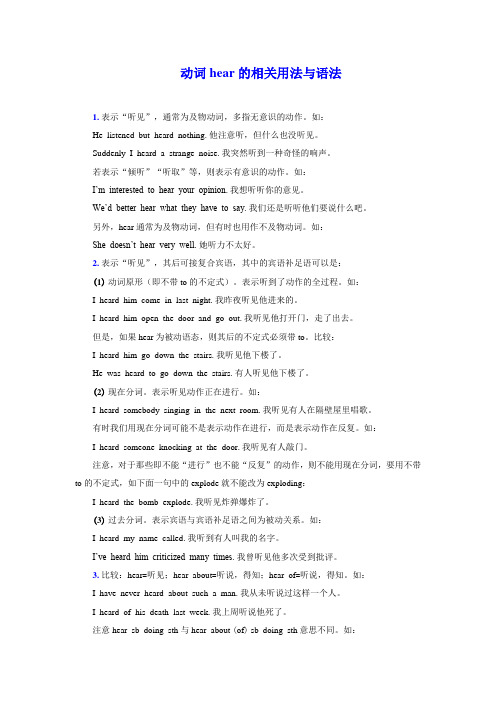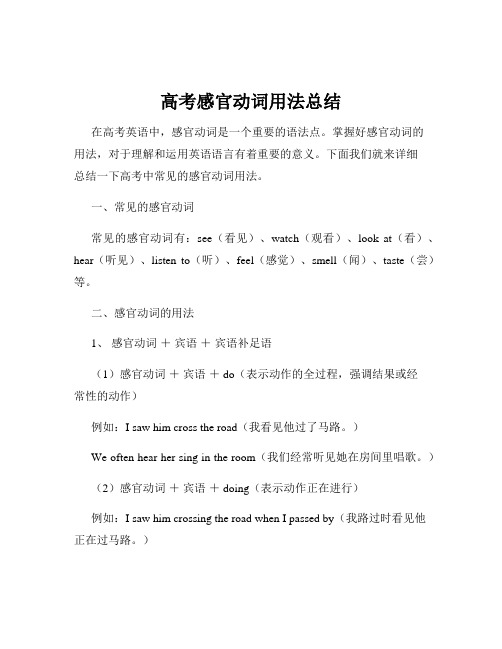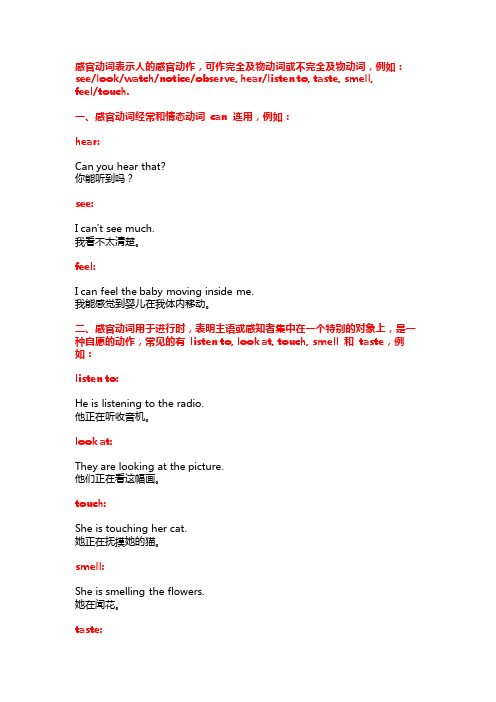hear等词的用法
- 格式:docx
- 大小:20.19 KB
- 文档页数:8

动词hear的相关用法与语法1.表示“听见”,通常为及物动词,多指无意识的动作。
如:He listened but heard nothing. 他注意听,但什么也没听见。
Suddenly I heard a strange noise. 我突然听到一种奇怪的响声。
若表示“倾听”“听取”等,则表示有意识的动作。
如:I’m interested to hear your opinion.我想听听你的意见。
We’d better hear what they have to say.我们还是听听他们要说什么吧。
另外,hear 通常为及物动词,但有时也用作不及物动词。
如:She doesn’t hear very well.她听力不太好。
2.表示“听见”,其后可接复合宾语,其中的宾语补足语可以是:(1)动词原形(即不带to的不定式)。
表示听到了动作的全过程。
如:I heard him come in last night. 我昨夜听见他进来的。
I heard him open the door and go out. 我听见他打开门,走了出去。
但是,如果hear为被动语态,则其后的不定式必须带to。
比较:I heard him go down the stairs. 我听见他下楼了。
He was heard to go down the stairs. 有人听见他下楼了。
(2)现在分词。
表示听见动作正在进行。
如:I heard somebody singing in the next room. 我听见有人在隔壁屋里唱歌。
有时我们用现在分词可能不是表示动作在进行,而是表示动作在反复。
如:I heard someone knocking at the door. 我听见有人敲门。
注意,对于那些即不能“进行”也不能“反复”的动作,则不能用现在分词,要用不带to的不定式,如下面一句中的explode就不能改为exploding:I heard the bomb explode. 我听见炸弹爆炸了。

的用法简单归纳如下hear“”“hear sb do sth1.hear经常听到某人做某作为行为动词听见时,听到某人做了某事表示或”“”hear sb doing sth.听到某人正在做某事,事表示2.hearabout ,hear about + sth 听到关於某事物的消息听说3.hear of + sb./sth [] 的情况听到或知道某人某事物4.hear from + sb=receive a letter from 电话等接到某人的来信、5.hear : 听说或得知(某事物)宾语从句: ,that,that 可省略。
当注意在宾语从句中作连词引导从句时上句是宾语从句hear vt. 听到,听;听说;审理hear sb I can hear you可以说可以听见某人说话1. I've just heard ______his promotion. 我刚刚听到了他被提升的事。
2. I have never heard ______ him since he left. 自从他离开后,我再没听到过他的消息。
3. Do you hear _____ you daughter this week? ? 今周你有收到你女儿的信吗4. I heard _______Tom would leave here. Tom.会离开这里我听说5. I think I can hear someone ______.( knock)6. Jane is going to resign. I heard her_____.( say)hear的用法简单归纳如下1. 后面(that)跟从句,如:I think I can do better than you .变否定句,I don't think I can do better than you.2用于摘入语,如:Who do you think is going to speak at the meeting?3. 后面跟代词so,例如:Yes ,I think so . No,I don't think so.4. think +宾语+宾语补足语He thinks himself very clever.People think him to be a good teacher.5. think +wh-词+不定式They couldn't think where to go .6. think + it(形式宾语)+形容词/名词+不定式/动名词/从句I don't think it polite to speak loudly in public.I think it best that you should stay here.7. 有think 构成的习惯用语有:think about 考虑,想到某人或某事,如:He was thinking about a maths problem.We must not think only of ourselves. think of 想,想到,如:What do you think of this T-shirt? 仔细考虑,如:8. think overplough. He thought it over and remembered that he had leraned the word还有打算、想到的意思,其后常跟动词不定式,例如:9. thinkWhen I thought to return,it was too late.think的反意疑问句10. 关于I think he is right, isn't he?主语是第一人称:They don't think I'm right,do they?主语是第二,三人称:use的用法简单归纳如下1. used to do sth.意为过去常常做某事,它表示过去经常发生的动作或存在的状态,而现在已不再发生或存在。

高考感官动词用法总结在高考英语中,感官动词是一个重要的语法点。
掌握好感官动词的用法,对于理解和运用英语语言有着重要的意义。
下面我们就来详细总结一下高考中常见的感官动词用法。
一、常见的感官动词常见的感官动词有:see(看见)、watch(观看)、look at(看)、hear(听见)、listen to(听)、feel(感觉)、smell(闻)、taste(尝)等。
二、感官动词的用法1、感官动词+宾语+宾语补足语(1)感官动词+宾语+ do(表示动作的全过程,强调结果或经常性的动作)例如:I saw him cross the road(我看见他过了马路。
)We often hear her sing in the room(我们经常听见她在房间里唱歌。
)(2)感官动词+宾语+ doing(表示动作正在进行)例如:I saw him crossing the road when I passed by(我路过时看见他正在过马路。
)I heard her singing in the room at that time(那时我听见她正在房间里唱歌。
)(3)感官动词+宾语+ done(表示宾语与宾语补足语之间是被动关系)例如:I saw the window broken(我看见窗户被打破了。
)We found the tree cut down(我们发现树被砍倒了。
)2、感官动词+宾语从句例如:I saw that he crossed the road safely(我看见他安全地过了马路。
)She heard that someone was knocking at the door(她听见有人在敲门。
)3、感官动词的被动语态感官动词在被动语态中,其后的宾语补足语要用带 to 的不定式。
例如:He was seen to cross the road(有人看见他过了马路。
)The girl was heard to sing in the room(有人听见这个女孩在房间里唱歌。

感官动词表示人的感官动作,可作完全及物动词或不完全及物动词,例如:see/look/watch/notice/observe, hear/listen to, taste, smell,feel/touch.一、感官动词经常和情态动词can 连用,例如:hear:Can you hear that?你能听到吗?see:I can't see much.我看不太清楚。
feel:I can feel the baby moving inside me.我能感觉到婴儿在我体内移动。
二、感官动词用于进行时,表明主语或感知者集中在一个特别的对象上,是一种自愿的动作,常见的有listen to, look at, touch, smell 和taste,例如:listen to:He is listening to the radio.他正在听收音机。
look at:They are looking at the picture.他们正在看这幅画。
touch:She is touching her cat.她正在抚摸她的猫。
smell:She is smelling the flowers.她在闻花。
taste:We are tasting champagne.我们正在品尝香槟。
并不是所有的感官动词都可以用进行时,例如:误:She was hearing a noise.误:He was seeing a woman in the rain.但当hear 在表达一种经历时,可以用进行时;see 在表达与人见面或是约会,可以用进行时,等等,例如:hearing:She was always hearing voices in her head.她脑子里总有声音。
seeing:She is seeing the doctor.她正在看医生。
He was seeing another woman.他在和另一个女人约会。

hear的用法简单归纳如下1、hear作为行为动词听见时,hear sb do sth表示“听到某人做了某事”或“经常听到某人做某事”,hear sb doing sth、表示“听到某人正在做某事”2、hear about 听说,hear about + sth 听到关於某事物的消息3、hear of + sb、/sth 听到或知道某人[某事物]的情况4、hear from + sb=receive a letter from 接到某人的来信、电话等5、hear 宾语从句: 听说或得知(某事物)注意: 上句就是宾语从句,当that在宾语从句中作连词引导从句时,that可省略。
hear vt、听到,听;听说;审理hear sb可以听见某人说话可以说I can hear you1、I've just heard ______his promotion、我刚刚听到了她被提升的事。
2、I have never heard ______ him since he left、自从她离开后,我再没听到过她的消息。
3、Do you hear _____ you daughter this week? 今周您有收到您女儿的信不?4、I heard _______Tom would leave here、我听说Tom会离开这里、5、I think I can hear someone ______、( knock)6、Jane is going to resign、I heard her_____、( say)hear的用法简单归纳如下1、后面(that)跟从句,如:I think I can do better than you 、变否定句, I don't think I can do better than you、2用于摘入语,如:Who do you think is going to speak at the meeting?3、后面跟代词so,例如: Yes ,I think so 、No,I don't think so、4. think +宾语+宾语补足语He thinks himself very clever、People think him to be a good teacher、5. think +wh-词+不定式They couldn't think where to go 、6. think + it(形式宾语)+形容词/名词+不定式/动名词/从句I don't think it polite to speak loudly in public、I think it best that you should stay here、7、有think 构成的习惯用语有:think about 考虑,想到某人或某事,如:He was thinking about a maths problem、think of 想,想到,如: We must not think only of ourselves、What do you think of this T-shirt?8、think over仔细考虑,如:He thought it over and remembered that he had leraned the word "plough"、9、think 还有打算、想到的意思,其后常跟动词不定式,例如:When I thought to return,it was too late、10. 关于think的反意疑问句主语就是第一人称:I think he is right, isn't he?主语就是第二,三人称:They don't think I'm right,do they?use的用法简单归纳如下1、 used to do sth、意为"过去常常做某事",它表示过去经常发生的动作或存在的状态,而现在已不再发生或存在。

hear用法hear用法:hear作为一个动词,可以表示“听到,听见”的意思,可以用来描述物体或声音,也可以用来描述人说话。
一、hear用作实义动词,后接名词,表示“听到,听见”,常用于间接引语中,其结构为:hear+名词/代词+that(从句)。
如:I heard that she was going to marry him.我听说她要嫁给他。
He heard the news from his mother.他从他母亲那里听到了这个消息。
二、hear用作实义动词,后接动词不定式,表示“听到,听见”,其结构为:hear+sb. + doing sth.。
如:We heard her singing in the next room.我们听到她在隔壁房间唱歌。
I heard the dog barking in the garden.我听到花园里有狗在叫。
三、hear用作实义动词,后接形容词/副词,表示“听见某种声音”,其结构为:hear+形容词/副词。
如:I heard voices coming from the house.我听到从屋子里传出的声音。
We could hear someone shouting outside.我们能听见外面有人在喊叫。
四、hear用作实义动词,后接介词短语,表示“听到某种声音”,其结构为:hear+介词短语。
如:We heard a noise coming from the kitchen.我们听到厨房里传来的噪音。
I heard someone laughing behind me.我听到身后有人在笑。
五、hear用作系动词,后接形容词/名词,表示“听到某种声音”,其结构为:hear+形容词/名词。
如:We heard loud music coming from the room.我们听到房间里传来的大声音乐。
I heard lovely singing from the balcony.我听到阳台上发出的可爱的歌声。

hear的用法简单归纳如下作为行为动词听见时,hear sb do sth表示“听到某人做了某事”或“经常听到某人做某事”,hear sb doing sth.表示“听到某人正在做某事”about 听说,hear about + sth 听到关於某事物的消息of + sb./sth 听到或知道某人[某事物]的情况from + sb=receive a letter from 接到某人的来信、电话等宾语从句: 听说或得知(某事物)注意: 上句是宾语从句,当that在宾语从句中作连词引导从句时,that可省略。
hear vt. 听到,听;听说;审理hear sb可以听见某人说话可以说I can hear you1. I've just heard ______his promotion. 我刚刚听到了他被提升的事。
2. I have never heard ______ him since he left. 自从他离开后,我再没听到过他的消息。
3. Do you hear _____ you daughter this week 今周你有收到你女儿的信吗4. I heard _______Tom would leave here. 我听说Tom会离开这里.5. I think I can hear someone ______.( knock)6. Jane is going to resign. I heard her_____.( say)hear的用法简单归纳如下1. 后面(that)跟从句,如:I think I can do better than you .变否定句, I don't think I can do better than you.2用于摘入语,如:Who do you think is going to speak at the meeting3. 后面跟代词so,例如: Yes ,I think so . No,I don't think so.4.think +宾语+宾语补足语 He thinks himself very clever.People think him to be a good teacher.5.think +wh-词+不定式 They couldn't think where to go .6.think + it(形式宾语)+形容词/名词+不定式/动名词/从句I don't think it polite to speak loudly in public.I think it best that you should stay here.7. 有think 构成的习惯用语有:think about 考虑,想到某人或某事,如:He was thinking about a maths problem.think of 想,想到,如: We must not think only of ourselves.What do you think of this T-shirt8. think over仔细考虑,如:He thought it over and remembered that he had leraned the word "plough".9. think 还有打算、想到的意思,其后常跟动词不定式,例如:When I thought to return,it was too late.10.关于think的反意疑问句主语是第一人称:I think he is right, isn't he主语是第二,三人称:They don't think I'm right,do theyuse的用法简单归纳如下1. used to do sth.意为"过去常常做某事",它表示过去经常发生的动作或存在的状态,而现在已不再发生或存在。

感官动词用法大全1.感官动词表示人的感官动作,可作完全及物动词或不完全及物动词,如:listen to(听),hear(听见),see(看见),watch(观看),feel (感觉)等。
Darling, did you hear something? 亲爱的,你听到什么了吗?Have you heard the news? 你听到这消息了吗?感官动词heard作完全及物动词。
2.感官动词作不完全及物动词时,后接宾语,再接原形不定词或分词作宾语补语。
But I really heard someone steal. 但我真听见有人在偷东西。
I heard her sing. 我听见她唱歌。
感官动词后接原形不定词强调事实。
I heard someone opening the cabinet. 我听见有人在开柜子。
I heard her singing. 我听见有人在唱歌。
感官动词后接现在分词强调动作正在进行。
3.感官动词的被动语态的宾语补语用不定词或现在分词。
Someone was heard to open the cabinet by us. 我们听到有人开柜子。
She was heard to sing in the concert. 人们听到她在音乐会上演唱。
不定词强调事实。
She was heard singing last night. 有人听到她昨天晚上在唱歌。
现在分词强调动作的进行。
4.感官动词表示被动含义时,不能用于进行时态;感官动词表示主动含义可以用于进行式。
hear, see通常分别以其相应意义的介系词动词listen to,look at的进行式来代替。
I feel some fruit juices on the soles of my feet. 我感觉到我脚底有果汁。
I feel a pin in it somewhere. 我感觉到这里什么地方有一根针。
表示被动含义。

感官动词的用法总结感官动词的用法总结1、感官动词的定义感官动词是指表示人的五官所感受到的各种物质和精神客观世界信息的动词,包括:see、hear、smell、taste、feel五种动词。
2、感官动词的用法(1)一般现在时:主语 + 感官动词 + 宾语例句:I see a bird in the tree.(2)一般过去时:主语 + saw / heard / smelled / tasted / felt + 宾语例句:I heard a loud noise last night.(3)现在完成时:主语 + have / has + seen / heard / smelled / tasted / felt + 宾语例句:I have seen the movie before.(4)过去完成时:主语 + had + seen / heard / smelled / tasted / felt + 宾语例句:He had seen the painting before he went to the museum.(5)现在进行时:主语 + be + seeing / hearing / smelling / tasting / feeling+ 宾语例句:She is hearing the music in the next room.(6)过去进行时:主语 + was / were + seeing / hearing / smelling / tasting / feeling + 宾语例句:He was tasting the soup when I came in.3、感官动词的特殊用法(1)see, hear, smell, taste, feel后面可以接形容词。
例句:I can see the beautiful flowers.(2)see, hear, smell, taste, feel后面可以接不定式。

hear的三种用法Hear是一个常见的英语动词,它有多种用法。
在本文中,我们将讨论hear的三种主要用法。
1. Hear的第一种用法是指听到声音或信息。
当我们听到某人说话、音乐或其他声音时,我们可以使用hear这个词。
例如:- I can't hear you. Can you speak up?- I heard a loud noise outside my window last night.- Did you hear about the new restaurant that just opened downtown?在上述例子中,hear被用来描述听到声音或信息的行为。
2. Hear的第二种用法是指获得消息或得知某事。
当我们从其他人那里得到消息或了解某件事时,我们可以使用hear这个词。
例如:- I heard that John got a promotion at work.- Have you heard the news? There's going to be a big storm tomorrow.- I heard through the grapevine that Sarah is getting marriednext month.在上述例子中,hear被用来描述获得消息或了解某件事的行为。
3. Hear的第三种用法是指出席会议、审判等活动并听取证言或陈述。
当我们出席会议、审判等活动并听取证言或陈述时,我们可以使用hear这个词。
例如:- The judge will hear the case next week.- The committee will hear testimony from experts before making a decision.- The teacher will hear presentations from each student in the class.在上述例子中,hear被用来描述出席会议、审判等活动并听取证言或陈述的行为。

Listen, hear和sound都是与声音有关的词汇,但它们在用法和含义上有所不同。
1. Listen: 这个词通常用于描述有意识地去听某个声音或某人说话。
例如:
- Please listen to me carefully.(请认真听我讲。
)
- I love listening to music when I work.(我喜欢在工作时听音乐。
)
2. Hear: 这个词表示听到某个声音,可以是有意的,也可以是无意的。
例如:
- I can hear the birds singing outside.(我能听到外面的鸟儿在唱歌。
)
- Did you hear what she said?(你听到她说的话了吗?)
3. Sound: 这个词既可以表示声音本身,也可以表示发出声音的动作。
例如:
- The sound of the waves is very soothing.(海浪的声音非常舒缓。
)
- He sounded the alarm when he saw the fire.(他看到火时拉响了警报。
)。

see watch notice hear feel用法
see/notice/watch/hear/feel 常用结构:
V + sb./sth. + do (强调事实或是动作发生在过去)
V + sb./sth. + doing (强调动作正在发生或进行)
1. 作为连系动词时,其意思分别为摸起来/看起来/听起来/闻起来/尝起来……后面接形容词作表语,说明主语所处的状态。
除look之外,其它几个动词的主语往往是物,而不是人。
例如:These flowers smell very sweet.这些花闻起来很香。
2.这些动词后面也可接介词like短语,like后面常用名词。
例如:Her idea sounds like fun.她的主意听起来很有趣。
3.这五个感官动词如果后面接名词作宾语,则这里的感官动词为实义动词,后面必须跟副词修饰动词。
以look一词为例:
He looked at me happily.(实义动词,“看”,后有宾语me ,用副词happily 修饰。
)
He looked happy.(系动词,“看起来……”,后接形容词作表语。
)。

单词解析:单词:hear 音标:/hɪə(r)/词性:动词释义:听到,听取;听说,获悉例句:1.I can't hear you.(我听不见你说话了。
)2.I heard a loud noise outside.(我听到外面有一声巨响。
)3.Have you heard the news about the election?(你听到选举的消息了吗?)4.I heard that she's getting married next month.(我听说她下个月要结婚了。
)5.Can you hear me now?(现在你能听到我说话了吗?)6.I can't hear what he's saying from this distance.(我离得太远听不清他在说什么。
)7.She heard the baby crying and went to check on him.(她听到孩子哭声就去查看他。
)8.I heard that you're planning to move to a new city.(我听说你计划搬到一个新城市。
)9.I can hear the birds singing outside my window.(我能听到窗外的鸟儿在唱歌。
)10.I've never heard such a strange story before.(我从未听说过这么奇怪的故事。
)11.Did you hear what happened at the concert last night?(你听说昨晚音乐会上发生了什么了吗?)12.I heard that the company is planning to lay off some employees.(我听说公司计划裁员。
)13.I can't hear the TV with all this noise.(有这么多噪音我听不到电视声音。

hear的动词过去式和过去分词hear有听说;得知等意思,那么你知道hear的动词过去式和过去分词是什么吗?下面是店铺为你整理的hear的动词过去式和过去分词,希望大家喜欢!hear的动词过去式和过去分词过去式: heard过去分词: heardv.听到,听见( hear的过去式和过去分词 ); 听说; 得知; 听取过去分词:heard的常见句型1. He stood emotionless as he heard the judge pass sentence.他面无表情地站在那里,听法官宣布判决。
2. Flying at 1,000 ft. he heard a peculiar noise from the rotors.在1,000英尺的高度飞行时,他听到旋翼发出一种奇怪的噪音。
3. Rose heard the familiar voice, but tuned out the words.罗斯听到了熟悉的声音,但没注意听说的是什么。
4. He heard tires squeal as the car braked to avoid a collision.为避免相撞而刹车时,他听到了轮胎与地面刺耳的摩擦声。
5. I heard the engines revving as the lorries backed and turned.卡车倒车和掉头的时候,我听见发动机的轰鸣声。
6. She had heard the news-flash on a TV channel's news update.她在一家电视台的新闻快讯中听到了这则简明新闻。
7. I heard them coming, crashing through the undergrowth, before I saw them.还没看到他们,我便听到他们穿过矮树丛过来的声音。
8. As they pass by, a piteous wailing is heard.他们经过时,响起了令人哀怜的恸哭。

在英语中,“听”有三个主要的用法,分别是:listen、hear和sound。
1.Listen 强调听的动作,后面接人或人物做宾语,着重于“倾听”,至于是否听到,并非
强调的重点。
例如:Please listen to me.(请听我说。
)
2.Hear 强调听的结果,可翻译成“听到”。
过去式heard与of搭配可翻译成“听说”。
固
定搭配:hear sb do sth 听见某人干某事(全过程),hear sb doing sth 听见某人正在干某事。
例如:I can't hear you in such a noisy place.(我无法在这么一个吵闹的地方听见你讲话。
)
3.Sound 强调感受,后加形容词。
翻译成“听上去...”,“听起来...”。
例如:That sounds good.
(那听起来不错。
)
以上三个词的用法并不完全相同,需要根据具体的语境来理解其含义和用法。

hear的形容词形式及其用法分析hear是一个常用的英语动词,表示“听到,听见,得知,审理”等意思。
hear的形容词形式有两种,一种是hear的过去分词heard,另一种是hear的现在分词hearing。
这两种形容词形式都可以用来修饰名词或代词,表示“被听到的,听说的,听力的,审理的”等含义。
本文将介绍hear的形容词形式的用法和例句,并比较heard和hearing之间的区别和联系。
heardheard是hear的过去分词,也可以作为形容词使用。
作为形容词时,heard通常表示“被听到的,听说的”等意思。
例如:He is a well-known and widely heard radio presenter. 他是一个知名而广受欢迎的电台主持人。
hearinghearing是hear的现在分词,也可以作为形容词使用。
作为形容词时,hearing通常表示“听力的,审理的”等意思。
例如:He has a hearing problem. 他有一个听力问题。
She wears a hearing aid. 她戴着助听器。
The hearing of the case was postponed. 这个案件的审理被推迟了。
He was granted a fair hearing. 他得到了公正的审判。
hearing还可以用来构成一些固定短语或习惯用法,例如:hearing loss:听力损失。
如:He suffered from hearing loss due to loud noise. 他因为噪音太大而导致听力损失。
hearing test:听力测试。
如:She took a hearing test at the hospital. 她在医院做了一个听力测试。
public hearing:公开听证会。
如:The committee held a public hearing on the issue. 委员会就这个问题举行了一个公开听证会。

hear的用法归纳咱们平常学英语的时候,hear 这个词可是经常出现呢!今天咱们就来好好唠唠 hear 的用法。
先来说说 hear 最常见的意思,就是“听见、听到”。
比如说,“I hear a bird singing outside the window”(我听到窗外有一只鸟在唱歌。
)这时候 hear 就是单纯地表示听到某个声音。
有时候 hear 后面还会接宾语从句,像“He heard that his friend was ill”(他听说他的朋友生病了。
)这里 hear 表达的是获取到某个消息或者情况。
再说说 hear from 这个短语,意思是“收到……的来信”。
“I haven't heard from my parents for a long time”(我好久都没有收到我父母的来信了。
)想象一下,你满心期待地等着远方亲人朋友的信件,那种期待又焦急的心情,是不是很能理解 hear from 所包含的含义啦。
还有 hear of ,表示“听说”。
“Have you heard of this new movie?”(你听说过这部新电影吗?)这就好比你和朋友聊天,突然提到一个新鲜事物,然后互相询问有没有听说过。
给大家讲个我自己的小经历吧。
有一次我在公园里散步,突然听到一阵悠扬的小提琴声。
我顺着声音找过去,看到一个小男孩正在认真地演奏。
我走上前去,跟他聊了起来。
他告诉我,他每天都会来这里练习,因为他梦想着有一天能在舞台上演奏。
我当时就特别感慨,这不就是努力追求梦想的声音嘛。
而这里面,“听到”这个动作,用的就是 hear 这个词。
那咱们再回到 hear 的用法上来。
hear 用于被动语态的时候,要注意哦。
“The song was heard everywhere”(这首歌到处都能听到。
)另外,hear 与 listen 可不一样。
Listen 强调的是“听”这个动作,而hear 强调的是“听见、听到”这个结果。

hear的用法和固定搭配Hear的用法和固定搭配在我们日常生活当中,hear一词的用法是非常常见的。
它是指通过耳朵接收到声音、信息或消息等。
而在具体的使用中,hear也有一些固定的搭配和用法,接下来就让我们来仔细地了解一下。
Hear的用法基本用法Hear作为一个动词,可以用于表达听到的意思。
例如:I can hear the music.我可以听到音乐。
固定搭配Hear也有一些固定的搭配,下面就让我们来了解一下。
1. Hear about这个搭配的意思是听说、得知,常常被用于表达听到某件事情的消息,例如:Did you hear about the accident yesterday?你听说昨天的事故了吗?2. Hear from这个搭配的意思是从某人那里听到消息,例如:I heard from Jack that he can't come tomorrow.我从杰克那里听说他明天不能来。
3. Can't hear oneself think这个搭配用于形容非常吵闹的环境,导致无法集中思考,例如:The construction outside is so loud that I can't hear myself think.外面的建筑工程太吵了,我都听不到自己的思绪了。
4. Hear someone out这个搭配的意思是认真地听取某人的意见或建议,例如:I think you should hear him out before making any decision.在作出任何决定之前,我想你应该认真听取他的意见。
5. Hear it through the grapevine这个搭配的意思是从别人的传言或谣言中听到某件事,例如:I heard it through the grapevine that John got a new job.我从谣言中听说约翰找到了一份新工作。

hear的名词形式Hear是一个常用的英语动词,意为“听到”,如:I can hear the birds singing outside. (我能听到外面的鸟儿在唱歌。
)。
此外,hear还有名词形式,即hearing,表示“听力”、“听觉”,它的用法广泛,下面就来简单介绍一下。
一、听力或听觉功能Hearing可以指人或动物的听力或听觉功能,如:My hearing has become worse as I get older. (随着年龄的增长,我的听力变得越来越差。
)。
此外,还可以用于描述事物的听觉属性,如:The hearing of a dog is much better than that of a human. (狗的听觉比人类好得多。
)二、听证会Hearing还可以表示“听证会”,即审讯、听证或法庭审判中的听证会,如:The hearing lasted for several hours before the judge made his decision. (听证会持续了几个小时,法官才做出决定。
)三、机会听取某人Hearing还可以表示“机会听取某人”,如:I finally got a hearing with the CEO to discuss my ideas. (我终于有机会与CEO 会面,讨论我的想法。
)四、听说的消息Hearing还可以表示“听闻的消息”,如:I had a hearing that she was getting married next month. (我听说她下个月要结婚了。
)总之,Hearing作为名词形式,在英语中的使用非常广泛,是我们平时口语和书面语中必须要注意使用的一个词汇。
我们需要根据语境合适地使用它,以避免产生误解或不必要的困惑。
hear的用法简单归纳如下1.hear作为行为动词听见时,hearsbdosth表示“听到某人做了某事”或“经常听到某人做某事”,hearsbdoingsth.表示“听到某人正在做某事”2.hearabout听说,hearabout+sth听到关於某事物的消息3.hearof+sb./sth听到或知道某人[某事物]的情况4.hearfrom+sb=receivealetterfrom接到某人的来信、电话等5.hear宾语从句:听说或得知(某事物)注意:上句是宾语从句,当that在宾语从句中作连词引导从句时,that可省略。
hearvt.听到,听;听说;审理hearsb可以听见某人说话可以说Icanhearyou1.I'vejustheard______hispromotion.我刚刚听到了他被提升的事。
2.Ihaveneverheard______himsinceheleft.自从他离开后,我再没听到过他的消息。
3.Doyouhear_____youdaughterthisweek今周你有收到你女儿的信吗4.Iheard_______Tomwouldleavehere.我听说Tom会离开这里.5.IthinkIcanhearsomeone______.(knock)6.Janeisgoingtoresign.Iheardher_____.(say)hear的用法简单归纳如下1.后面(that)跟从句,如:IthinkIcandobetterthanyou.变否定句,Idon'tthinkIcandobetterthanyou.2用于摘入语,如:Whodoyouthinkisgoingtospeakatthemeeting3.后面跟代词so,例如:Yes,Ithinkso.No,Idon'tthinkso.4. think+宾语+宾语补足语Hethinkshimselfveryclever.Peoplethinkhimtobeagoodteacher.5. think+wh-词+不定式Theycouldn'tthinkwheretogo.6. think+it(形式宾语)+形容词/名词+不定式/动名词/从句Idon'tthinkitpolitetospeakloudlyinpublic.Ithinkitbestthatyoushouldstayhere.7.有think构成的习惯用语有:thinkabout考虑,想到某人或某事,如:Hewasthinkingaboutamathsproblem.thinkof想,想到,如:Wemustnotthinkonlyofourselves.WhatdoyouthinkofthisT-shirt8.thinkover仔细考虑,如:Hethoughtitoverandrememberedthathehadleranedtheword"plough".9.think还有打算、想到的意思,其后常跟动词不定式,例如:WhenIthoughttoreturn,itwastoolate.10. 关于think的反意疑问句主语是第一人称:Ithinkheisright,isn'the主语是第二,三人称:Theydon'tthinkI'mright,dotheyuse的用法简单归纳如下edtodosth.意为"过去常常做某事",它表示过去经常发生的动作或存在的状态,而现在已不再发生或存在。
这个短语含有今昔对比之意,其否定形式常用usednotto或didn'tuseto。
反意疑问句中应该用did/didn't或used/usedn't。
例如:Iusedto_____inthisriverwhenIwasyoung.我年轻时常在这条河里游泳。
Theyusedto_____goodfriends,_______they他们过去是好朋友,是吗?2.beusedtosth./doingsth.意为"习惯、适应某事/做某事",它表示习惯于某一客观事实或状态,其中to是介词,后面跟名词、代词或动名词;beused可用于多种时态;如强调动作可用get或become替换be。
例如:Oldpeopleareusedto_______upearlyinthemorning.老年人习惯早晨很早起床。
Iwasn'tusedtocitylife,butnowIhavegotusedto________inthiscity.我以前不习惯都市生活,但现在我已习惯住在这座城市了。
3.beusedtodosth.意为"被用来做某事",其中use表"使用"之意,是被动语态形式,to是动词不定式符号。
例如:Woodcanbeusedtomakepaper.树木可以用来造纸。
4.beusedfor...意为"被当做……",其中use表"使用"之意,是被动语态形式。
例如:Theseal'sfurcanbeusedforcoats.海豹皮可当做大衣用。
5.beofuse意为"有用的",其中use是名词,可用形容词来修饰。
例如:Thedictionaryisofgreatusetothestudents.这本字典对学生们很有用。
6.beinuse意为"在使用",其中use也是名词。
例如:Thelaboratoryisinuseuntilthreeo'clock.实验室一直到3点钟都有人使用。
7.makeuseofsth.意为"利用、使用某物",其中use也是名词,可用good,full,more,little等形容词来修饰。
同学们应特别注意它的被动形式。
例如:Wemustmakefulluseoftimetostudy.我们必须充Ⅰ.单项选择。
()1.Thefashionshowis____wonderful____wealllikeit.A.too;toB.so;thatC.such;thatD.very;that()2.—WouldyouliketohavealookatsomepantsTheymayfityouwell.—Well,I’dliketotrythoseblue____.A.pairsB.oneC.pantD.pair()3.Thegirlwantedtomakealotofmoney____shecouldbuythesilkcheongsam.A.andB.butC.sothatD.because()4.Themanis____thanhisfather.A.handsomeB.muchhandsomeC.morehandsomeD.morehandsomer()5.Hisparentsdon’tallowhim____.A.smokeB.tosmokeC.smokingD.smokes()6.—____doyouwear—SizeXL.A.WhatcolorB.HowsizeC.HowmuchD.Whatsize()7.Tomsaidhe____atthattime.A.iscookingB.cookedC.wascookingD.cooks()8.Idon’tknow____.A.wheretheshopisB.whereistheshopC.howcanIgetthereD.howdoyougetthere ()9.Peopleshouldaskthepoliceforhelpwhentheyare____.A.indangerousB.insafetyC.indangerD.insafe()10.Thepolicewomanstoppedthemanfrom____somethingbad.A.doB.doingC.doesD.willdo()11.Isthere____intoday’sshowA.somethinginterestingB.interestingsomethingC.interestinganythingD.anythinginteresting()12.—Excuseme,couldyoutellme____—There’sabankonthesecondfloor.Youcandoitthere.A.whereIcanchangemoneyB.howIcangettothebankC.ifthere’sabanknearhereD.wherethebankis()13.Thereporterwasbusy____thefamousmodel.A.interviewingB.interviewsC.interviewedD.interview()14.Kateisalittlefat.Hermotheradvisesher____clothesindarkcolors.A.wearB.towearC.wearingD.wears()15.Beijingisinthe____partofChina.A.southB.northC.southernD.Northern()16.I'veneverheard____himbefore,however,Isawhimrunningontheplaygroundy esterday.A.fromB.ofC.aboutD.out()17.----Anythingelse----______________A.No,that'sall.B.Sure,thatall.C.OK,I'mfull.D.Itdoesn'tmatter.()18.Waitamoment,please.It____aboutfiveminutestoprepareyourdishes.A.spendsB.costsC.willpayD.willtake()19.Theyreallyneedahouse_______.A.liveB.toliveC.toliveinD.Lived()20.Thinkitoverbefore______importantdecisions.A.tomakeB.makeC.makingD.makesⅡ.情景交际。
(A)根据对话情景选择恰当的选项,其中有两项是多余的。
MissLee—LMr.Zhang—ZL:Hello,Mr.Zhang.WhatareyougoingtodoZ:Ihavefinishedmywork.16L:WouldyouliketogoshoppingwithmeZ:17L:Youknow,myparentsloveTangcostumesverymuch.Iwanttobuysomeforthem. Z:Ihearthereisgoingtobeafashionshowintheshoppingcenter.18L:Goodidea!WhenshallwemeetZ:19L:Bytheway,whatareTangcostumesmadeofZ:20L:Isee.OK.Seeyoutomorrow.Z:Seeyou.(B)根据对话内容填空,补全对话。